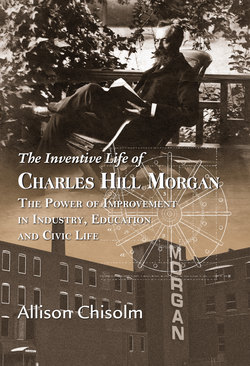Читать книгу The Inventive Life of Charles Hill Morgan: The Power of Improvement In Industry, Education and Civic Life - Allison Chisolm - Страница 15
На сайте Литреса книга снята с продажи.
DRAFTING OPENS NEW WORLDS
ОглавлениеWhile Morgan’s formal education ended in 1846, his technical training had only just begun. He continued to work for Bigelow’s company, apprenticing in the machine shop supervised by his uncle, J.B. Parker. But as Charles saw better, more efficient ways to accomplish certain mechanical tasks, he found his education had not prepared him to express his ideas through the common technical language understood by mechanics and engineers. He needed drafting skills to put his ideas on paper.
He asked John C. Hoadley, civil engineer of the Clinton Mills and one of the architects of Lancaster’s town hall, for lessons in mechanical drawing. The habits of study, so eagerly cultivated at Lancaster Academy, served him well. In late 1847 or early 1848, Charles took drafting lessons at night with Hoadley, after working at least 12 hours a day in the machine shop. Those 13 lessons proved to be a crucial foundation for his later successes. Impressed by the boy’s eagerness to learn, Erastus Bigelow loaned Charles books on mechanics from his personal library.
Morgan tapped Hoadley’s expertise at just the right time, as Hoadley left Clinton for Lawrence only a few months after their lessons ended. Hoadley’s successor at the Bigelow enterprises, Joshua Thissell, noted that Hoadley was a New Yorker who had arrived in New England in 1845. He must have been a patient tutor to Morgan, as “he was an accomplished gentleman, a fine scholar, an excellent draftsman, a good engineer,” Thissell reported. “Polite, affable and agreeable, he had many friends; I never saw him show the least temper under the most provoking circumstances.”
As the coach lace loom business waned by the late 1840s, victim to the transportation shift from horse-drawn coaches to railway carriages, Bigelow opened a counterpane, or quilt mill in 1841, incorporating that business as Lancaster Mills in 1844. It grew to become one of the largest gingham cloth mills in the world.
Employment opportunities continued to expand in Clinton, as Bigelow refined a power weaving loom for carpets by 1848 and incorporated Bigelow Carpet Company in 1854. Applying the same power loom concepts to weaving wire, Bigelow soon after opened the Clinton Wire Cloth Company in 1856.
“In this town,” recalled early resident Neil Walker, “E.B. Bigelow did for the weaving industry of this time what Eli Whitney did for the raw cotton industry.” Whitney’s invention of the cotton gin in 1793 had revolutionized cotton production in the United States and across the globe.
Together with the Bigelow brothers’ business, Clintonville village grew throughout the 1840s and, by 1848, began to petition for its independence from Lancaster. Residents were becoming restless, much like colonial revolutionaries under an oppressive government. As one historian noted, “Lancaster was unwilling to spend amounts on schools, roads, and other necessary improvements...[and] Clintonville was unwilling to pay taxes without having the full benefit of them.”
At its birth in 1850, the new town had 2,778 residents. Within five years, that number grew to 3,635. For its independence, Clinton agreed to pay Lancaster $10,000 over 10 years. Clinton, it was reported, “received two-thirds of Lancaster’s population, but only one-fifth of her acreage.” In addition, it acquired “five cheaply-built district schoolhouses.”
Prepared in compliance with the Act of the Legislature of Massachusetts establishing the town of Clinton, the official List of Voters includes the name of Hiram Morgan, noted as a member of the Free-Soil Party. A political party founded only a few years earlier, the Free Soilers supported commercial relations between the Northern and Southern states, but believed that slavery, which was constitutionally protected at the time, should not spread into any new states, such as Kansas or those southwestern territories recently won from Mexico. With the slogan, “free soil, free speech, free labor, and free men,” the party attracted those farmers, workers and merchants who did not want to compete with slave-supported businesses in new regions.
Tower of the Bigelow Carpet Company, Clinton, Massachusetts
